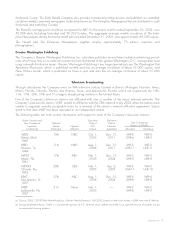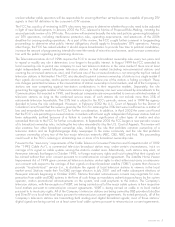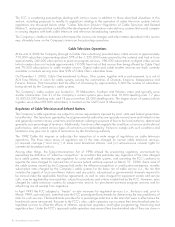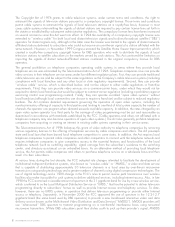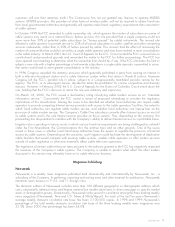Washington Post 2002 Annual Report Download - page 15
Download and view the complete annual report
Please find page 15 of the 2002 Washington Post annual report below. You can navigate through the pages in the report by either clicking on the pages listed below, or by using the keyword search tool below to find specific information within the annual report.1,200 students were enrolled at Concord. Concord is accredited by the Accrediting Commission of the Distance
Education and Training Council and has received operating approval from the California Bureau of Private Post-
Secondary and Vocational Education. Concord also has complied with the registration requirements of the State Bar
of California; graduates are, therefore, able to apply for admission to the California Bar. The College for Profession-
al Studies, which had over 4,400 students enrolled at year-end 2002, offers bachelor and associate degree and
diploma correspondence programs in the fields of legal nurse consulting, paralegal studies and criminal justice;
however, that school is no longer enrolling students and will discontinue operations after its current students complete
their programs.
One of the ways a foreign national wishing to enter the United States to study may do so is to obtain an F-1 student
visa. For many years, most of Kaplan’s Test Preparation and Admissions Division centers in the United States have
been authorized by what is now the U.S. Bureau of Citizenship and Immigration Services (the ‘‘BCIS’’) to issue
certificates of eligibility to prospective students to assist those students in applying for F-1 visas through a U.S.
Embassy or Consulate. Under a program that became effective early in 2003, educational institutions are required
to report electronically to the BCIS specified enrollment, departure and other information about the F-1 students to
whom they have issued certificates of eligibility. Most of Kaplan’s U.S. Test Preparation and Admissions Division
centers have been designated to participate in this new program, and the applications of the other centers where
Kaplan is seeking such a designation are pending. During 2002 students holding F-1 visas accounted for approxi-
mately 2.5% of the enrollment at Kaplan’s Test Preparation and Admissions Division and an insignificant number of
students at Kaplan’s Higher Education Division.
Title IV Student Financial Assistance Programs
Funds provided under the student financial assistance programs that have been created under Title IV of the Higher
Education Act of 1965, as amended, historically have been responsible for a majority of the net revenues of the
schools in Kaplan’s Higher Education Division which provide classroom-based instruction (including Kaplan Col-
lege), accounting, for example, for slightly more than $160 million of the net revenues of such schools for the
Company’s 2002 fiscal year. The significant role of Title IV funding in the operations of these schools is expected to
continue.
To maintain Title IV eligibility a school must comply with extensive statutory and regulatory requirements relating to its
financial aid management, educational programs, financial strength, recruiting practices and various other matters.
Among other things, the school must be authorized to offer its educational programs by the appropriate governmen-
tal body in the state or states in which it is located, be accredited by an accrediting agency recognized by the U.S.
Department of Education (the ‘‘Department of Education’’), and enter into a program participation agreement with
the Department of Education.
A school may lose its eligibility to participate in Title IV programs if student defaults on the repayment of Title IV loans
exceed specified default rates (referred to as ‘‘cohort default rates’’). A school whose cohort default rate exceeds
40% for any single year may have its eligibility to participate in Title IV programs limited, suspended or terminated at
the discretion of the Department of Education. A school whose cohort default rate equals or exceeds 25% for three
consecutive years will automatically lose its Title IV eligibility for at least two years unless the school can demonstrate
exceptional circumstances justifying its continued eligibility. Moreover, a for-profit postsecondary institution, like
each of these Kaplan schools, will lose its Title IV eligibility for at least one year if more than 90% of the institution’s
cash receipts for any fiscal year are derived from Title IV programs.
The Title IV program regulations also provide that not more than 50% of an eligible institution’s courses can be
provided online and that, in some cases, not more than 50% of an eligible institution’s students can be enrolled in
online courses, and impose certain other requirements intended to insure that individual programs (including online
programs) eligible for Title IV funding include minimum amounts of instructional activity. However, Kaplan College
currently is a participant in the distance education demonstration program of the Department of Education and as a
result is exempt from the foregoing requirements until at least June 30, 2004. Legislation currently is pending in
Congress which, if enacted, would exempt online courses from those requirements under certain circumstances,
including the maintenance by the institution offering such courses of a cohort default rate of less than 10% for three
consecutive years.
No proceeding by the Department of Education is pending to fine any Kaplan school for a failure to comply with any
Title IV requirement, or to limit, suspend or terminate the Title IV eligibility of any Kaplan school. However no
assurance can be given that the Kaplan schools which currently participate in Title IV programs will maintain their
2002 FORM 10-K 13


